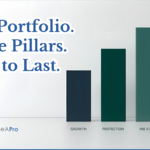Investing in gold has always been a topic of significant discourse among investors. Gold’s enduring appeal, its historical value, and its reputation as a “safe haven” investment continue to make it a popular choice.
However, whether it is truly a worthwhile investment is a point of contention. In this post, we will dive into the current gold market, its historical context, and evaluate whether gold should be a part of your investment portfolio.
Lately, gold has been making headlines as it reaches new highs. In light of this, we’re going to explore what’s happening, the historical context of gold prices, and what factors are currently driving the price of gold.
Gold’s Historical Performance
Gold is making new highs, a fact that is widely celebrated. But I’ve never been a huge fan of gold, and you need to look at its long-term performance to understand why. Gold doesn’t pay a cash flow, dividends, or rents, unlike property or shares. This lack of cash flow makes it difficult to value gold as an asset.
Consider the period between 1980 and 2005, a span of 25 years during which gold prices largely stagnated or declined. This can be very disappointing for long-term holders of gold. In contrast, shares and property have generally appreciated, primarily due to their income-generating capabilities.
Gold and Inflation
There’s a popular belief that gold is a great hedge against inflation. However, historical data doesn’t support this notion. During the 25-year period from 1980 to 2005, even when inflation was often high, gold prices did not rise accordingly. The same was observed recently during the post-COVID inflation spike when gold prices remained largely flat despite rapidly increasing inflation rates.
When Gold Shines
Gold does perform well during periods of macroeconomic stress, credit issues, and liquidity problems. During the global financial crisis from 2006 to 2010, gold prices more than doubled. Similarly, in the face of the COVID-19 crisis, gold acted as a fear hedge. Gold tends to do well whenever there are significant global economic or geopolitical turmoil.
Another scenario where gold performs well is when bond yields decline. As gold does not produce cash flow, its relative attractiveness increases when other yield-generating investments become less profitable. This explains the recent uptrend in gold prices, which some attribute to central banks like those in China and Russia offloading dollar reserves in favor of gold—though this claim lacks strong evidence.
The Current State of Gold
Recent strength in gold prices can be attributed to several factors:
- Peaking Interest Rates: Central banks have hinted at the peak of the current interest rate cycle, which could make gold relatively more attractive.
- Geopolitical Concerns: Ongoing conflicts in the Middle East and Eastern Europe make gold appealing as a hedging tool.
- Speculation: Traders often jump on the bandwagon, leading to price spikes.
Should You Own Gold?
If you’re considering adding gold to your portfolio, think about it in terms of diversification. Gold can act as portfolio insurance, especially during times of crisis or economic uncertainty. Owning a small portion of gold could provide a hedge against potential downturns in other asset classes.
How to Invest in Gold
There are several ways to invest in gold:
- Physical Gold: You can buy gold coins or bars, though storage costs can add up.
- ETFs: An efficient way to own gold, as they track the price of gold daily and can be included in tax-efficient accounts like ISAs or pensions.
- Gold Mining Companies: Investing in these companies can offer a leveraged exposure to the price of gold.
- Options: Allows for potential income generation through option premiums and potential ownership of gold at a discount.
Conclusion
Gold is not without its complexities and does not suit every investment strategy. It doesn’t hedge against inflation effectively, but it does protect against macro stresses and declining bond yields. If you decide to invest in gold, ensure it complements your overall portfolio strategy and adds value in times of crisis. Good luck with your investing!







